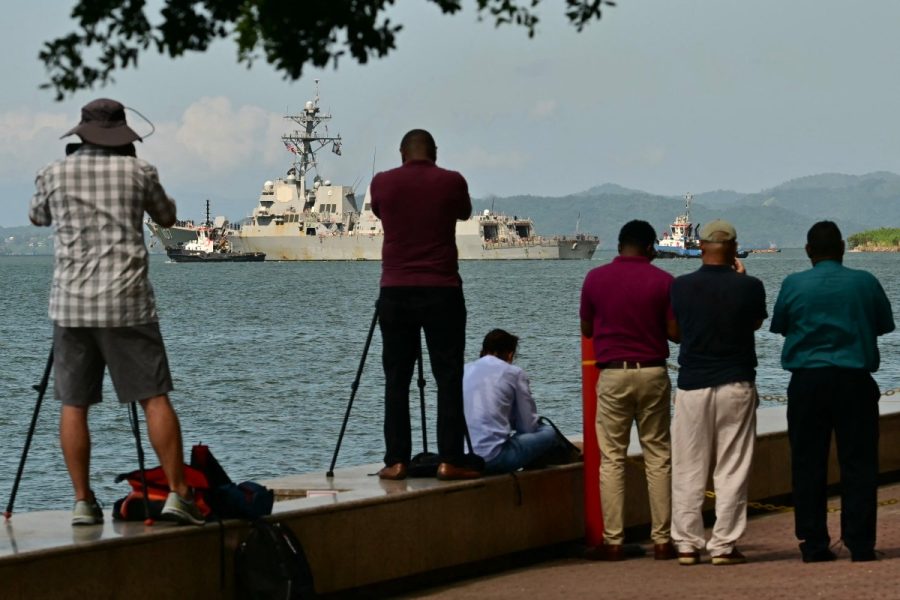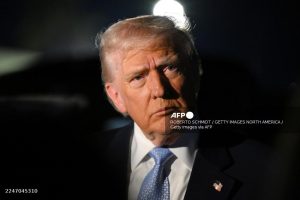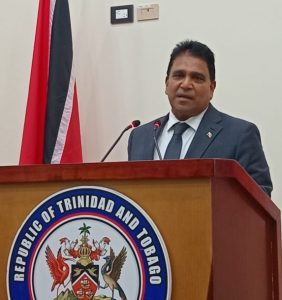Caption: Members of the media and the public watch and take pictures of the USS Gravely, a US Navy warship, departing the Port of Port of Spain on October 30, 2025.The US warship arrived in Trinidad and Tobago on October 26, 2025, for joint exercises near the coast of Venezuela, as Washington ratcheted up pressure on drug traffickers and Venezuelan leader Nicolas Maduro. AFP/Martin Bernetti
By Alicia Chamely
THE USS Gravely has left Port of Spain.
Just after 10 am on Thursday, the United States Naval guided missile destroyer departed the Port of Port of Spain dock, drawing a handful of curious onlookers.
The USS Gravely arrived in Port of Spain on Sunday morning, sparking curiosity and concern among the public as to whether the US warship’s arrival signalled T&T taking a more proactive role in the US’s fight against the Venezuelan drug cartels.
With the USS Gravely being docked within firing range to mainland Venezuela, the Venezuelan government denounced the US presence in T&T as an act of “military provocation of Trinidad and Tobago, in coordination with the CIA, aimed at provoking war in the Caribbean.”
Responding to public concern, the government indicated the USS Gravely was in T&T to participate in joint training exercises with the T&T Defence Force and Coast Guard. Noting, similar exercises had been carried out in the past and this visit had nothing to do with the conflict between the US and Venezuela.
@azpnews.com Off she goes! The US Gravely has left the Port of Spain Port. Video: Alicia Chamely @usnavy.com #ussgravely #departure #uswarship #sailing #security
Venezuela, however, continued to accuse Prime Minister Kamla Persad-Bissessar and her government of working with the US to overthrow the Nicolas Maduro regime.
As such, on Monday Venezuelan Vice President Delcy Rodriguez announced a proposal was being taken to the board of the Venezuelan state-owned energy company Petróleos de Venezuela, S.A (PDVSA) to terminate the Energy Cooperation Framework Agreement between the two countries.
This move would mean the end of the 30-year lease granted to the National Gas Company (NGC) to explore and move to exploit the natural gas reserves in the highly controversial Dragon Gas field. Rodriguez stated without the support of the PDVSA and Venezuela, T&T’s energy sector would suffer.
In response to this move, Persad-Bissessar, who had long been vocal in her support for the US’s intervention against the drug trade in the Caribbean, pushed back at Rodriguez stating T&T’s growth and economic stability was not solely dependent on Venezuelan gas.
She said, “Our future does not depend on Venezuela and never has. We have our plans and projects to grow our economy both within the energy and non-energy sectors.”
On Tuesday, Venezuelan National Assembly (AN) unanimously approved a declaration to deem Persad-Bissessar “persona non grata,” citing her alleged role in a “criminal conspiracy” with the US military to attack Venezuela.
The declaration accused Persad-Bissessar of conspiring with the US in a “systematic plan against the peace of Venezuela.”
Responding to this, a defiant Persad-Bissessar stated this declaration would not affect her nor her government in carrying out their duties.
Persad-Bissessar has remained resolute in her support of the US intervention in South America and the Caribbean, despite criticisms from other CARICOM nations, whom she has said do not suffer the same effects of cartel activities in their countries as T&T does.
The USS Gravely was one of the seven warships deployed to the Caribbean by the US government as part of an exercise to fight Venezuelan drug cartels.
To date US strikes on alleged drug smuggling boats in international waters in the Caribbean and Pacific have killed at least 62 people, with two of the deceased by T&T nationals.
![]()













